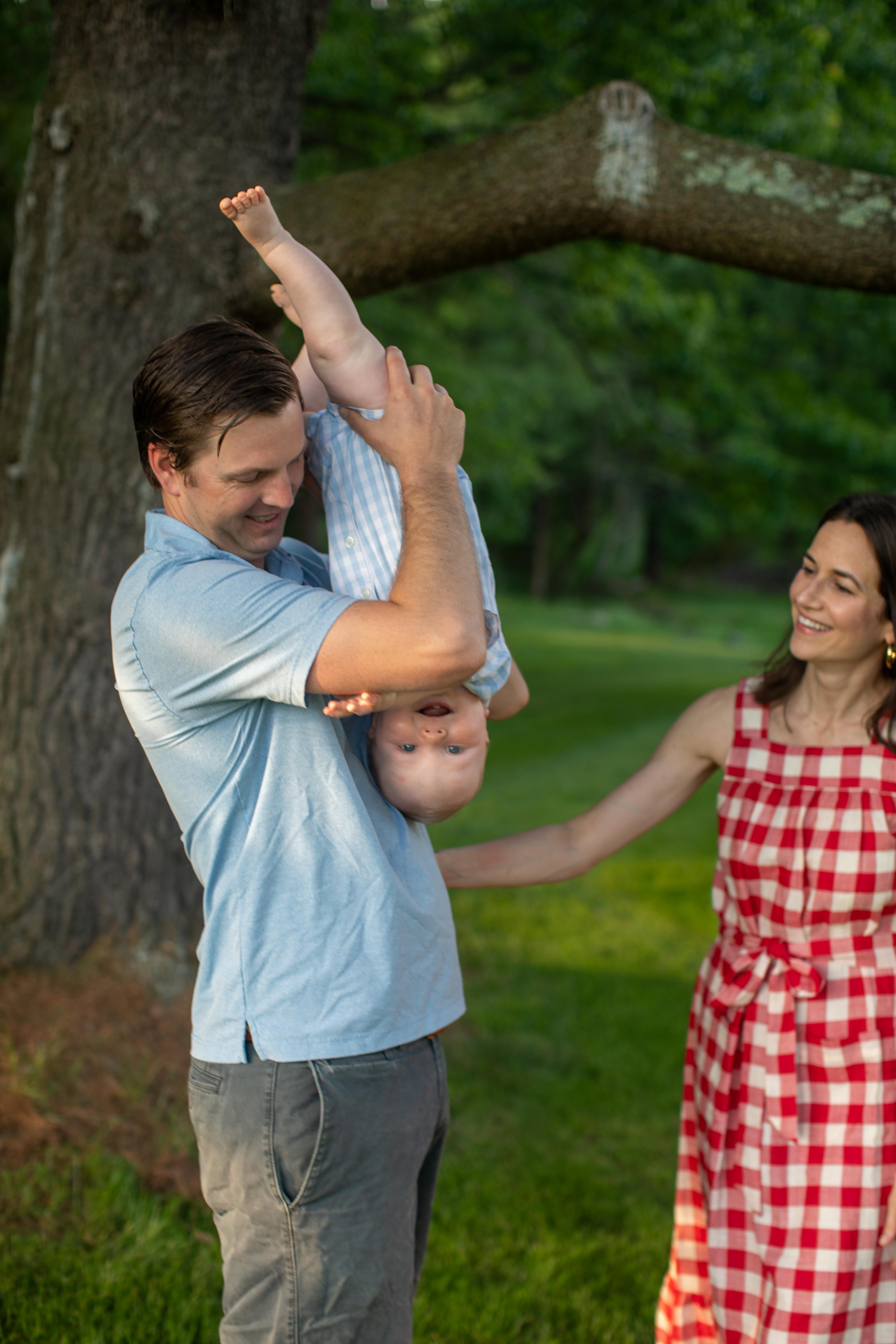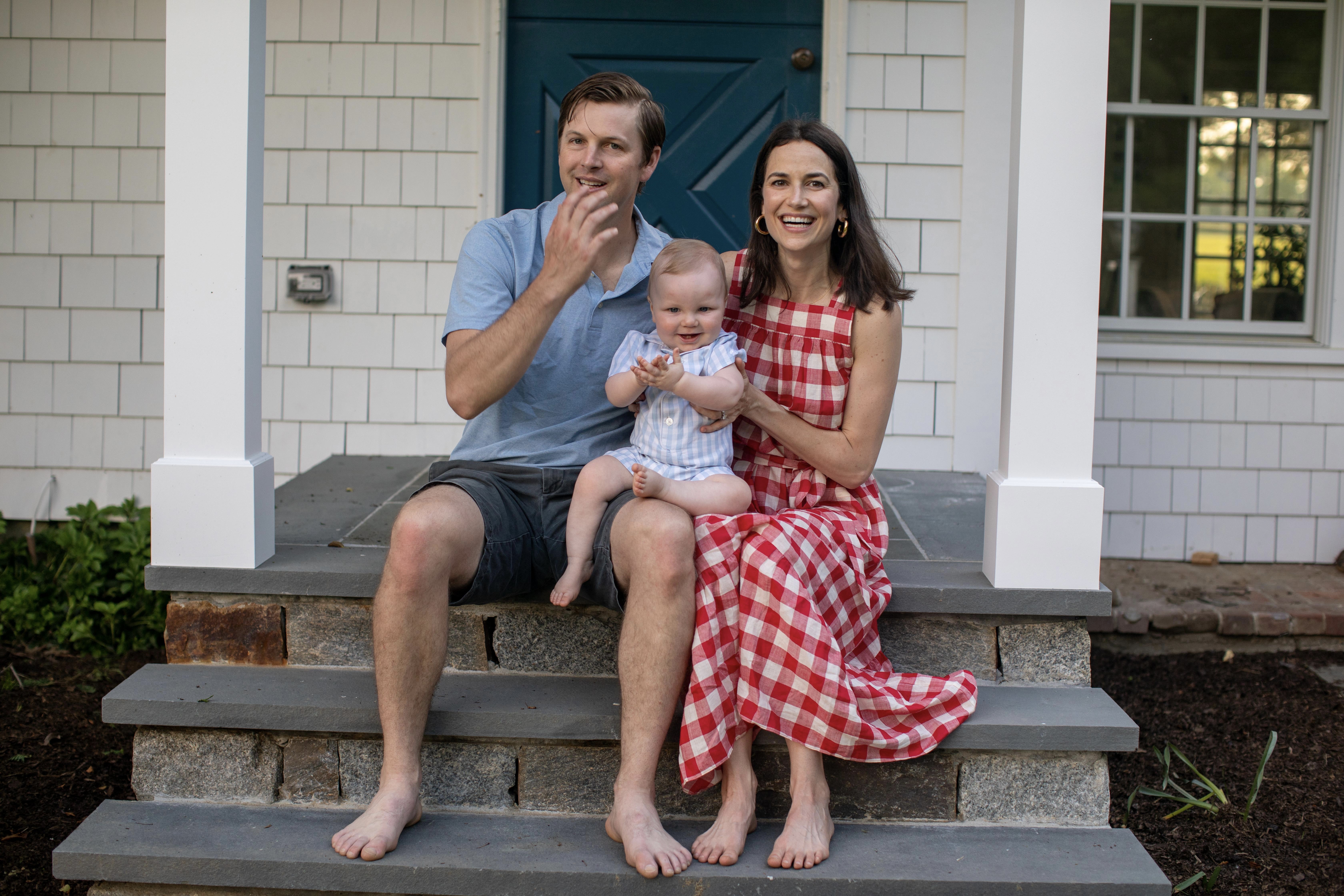Red Means Stop But I Forgot That
Novelist Carola Lovering on the car accident that made her rethink the motherhood/work/life juggle.

It’s the Sunday before Thanksgiving, and I’m rushing out the door. I’ve signed up to volunteer at the church my family and I recently joined—selling wreath kits to parishioners—because I’m making an effort to do more of that. That being: volunteer, give back, get involved with the community.
I’m upstairs in the bathroom putting on makeup, which generally feels like a chore, but especially so at 9:30 on a weekend morning. Downstairs, I can hear my 15-month-old son calling for me. Mama mama mama mama mama.
Pressure expands in my chest. As usual, I’m running late. As usual, my baby needs me. As usual, I’m pulled in multiple directions at once. I wonder how thin I can spread myself before I break apart.
Since I’m technically going to church, I have to dress nicely. My tights all have holes in them so I fish my good black pants from the laundry basket and yank them on. I use a straightening iron to tame the twirly pieces of postpartum hair that stick out all over my head in an unfortunate Medusa-like fashion. At some point, I decide I appear presentable enough.
It looks like a bomb went off in our bedroom—a dozen pairs of holey tights scattered on the unmade bed—but I don’t have time to dwell on this. I run downstairs and kiss my son on the lips, silently praying to a higher power that he’ll never stop letting me kiss him on the lips. Even though—inevitably—one day, he will.
I miss having the space that’s required to create something. I yearn for it; I’m homesick for that solitary, uninterrupted expanse.
I sift through the glass bowl of junk on the front hall table, digging for my car keys. I notice an exposed electrical outlet and call to my husband: “Hey, have you seen those outlet protector things I bought the other day? For babyproofing? I swear I put them somewhere, I swear I made myself remember where I put them, but now I have absolutely no idea…”
“What’d you say?” My husband is emptying the dishwasher in the kitchen; plates clink, he can’t hear me. We can never hear each other these days. One year of parenthood has launched us to old-married-couple status. We prattle at each other from across the house, each of us hollering at the other one to speak up.
Get exclusive access to fashion and beauty trends, hot-off-the-press celebrity news, and more.
“Ugh, nevermind!” I shout back, tousling my son’s hair. “Leaving!”
I hear my son begin to cry behind the front door as I jog towards the driveway. I hear my husband come to console him (“shh, Mommy will be right back”). Guilt swirls low in my belly. I feel like I’m always leaving, like I’m always busy. I can’t stand it.
In the front seat of my car, I plug the address of the church into Google Maps. Even though I’ve lived in this town for two years, I still don’t know how to get anywhere. Sense of direction has never been my strong suit.
It’s a seven-minute drive. Seven whole minutes, just for me. Instinctively, I venture into the creative recesses of my mind. I think about the new book I’ve been working on. It’s my fourth novel, and it’s a mess. Lately I haven’t had enough time to think about this book, let alone write it, and I miss having the space that’s required to create something. I yearn for it; I’m homesick for that solitary, uninterrupted expanse.
Therefore, it’s only natural for me to use these rare minutes of quiet in the car to my advantage. I turn inward, attempting to wrap my head around the novel’s elusive plot, convince myself it’s salvageable. Convince myself that the writer in me is salvageable. That she’ll find a way to survive this demotion in prioritization. The one where being a mom comes first, now and forever.
At a stop sign, I open Spotify and play a Taylor Swift song. The one everybody’s been playing lately. Jake Gyllenhaal and the scarf. Her voice soothes me like a tonic, the perfect backdrop to my swirling deliberations.
I turn left, and I’m three minutes from the church. At this rate, I’ll actually be on time. It’s a blindingly bright day and I’m grateful I remembered sunglasses.
My thoughts have shifted from writing, a stream of unconscious musings flood my mind. I think of my son’s proud little smile now that he’s walking; of how much I love my husband even though we bicker like cats in the morning; of the pie I’m supposed to bake for Thanksgiving; of the college friend I’ve promised to see for dinner in the city before the holiday; of the high school friend I still haven’t called back; of the exposed outlet in the front hall; of the fact that we’re out of milk again, of how I can stop on the way home and get some, and bananas and bread while I’m at it, because we’re out of those, too. I think of my decision to resubscribe to The New Yorker several months earlier, the weekly issues that have since piled up on the kitchen counter, not a single one ever cracked open. The way I smile at the cover for a few brief moments when the magazine arrives in the mail, pretend to appreciate something I’ll never get the chance to read.

Author Carola Lovering with her family
I glance up at the stoplight and the sun is a bright orb behind it, and the light is green, lit from within like an emerald, but what I don’t know is that it isn’t.
It’s red.
The stoplight is red, and even though I’m looking right at it, this is something my vision and brain fail to compute. Maybe it’s the sun’s fault, or maybe there is simply no more room in my overflowing neural pathways to register this simple fact of color.
Or maybe it’s something else entirely. Perhaps I merely want to see a green light—to see my life uninhibited and unchanged, flooded with the space and the consent to proceed as I did before I became someone’s mother. Perhaps I will this to be true, so much so that the delusion clouds the truth in front of me.
I speed through the light that is not green, not even close. My foot is on the gas, and that’s when I see it. Another car, coming from the left, heading straight towards me.
I know—in the split second before it happens—that we are going to collide. And in this fleeting moment it occurs to me, oddly, that I won’t make it to the church. That I won’t be volunteering today; that I put on mascara and blush only to go out and crash my car. As I brace myself for impact, I feel a sharp mixture of fear and gratitude. My son isn’t in the car, and that’s what matters.
I don’t remember much about the collision. The left side of my head strikes the window. The front of my leased Subaru flattens like an empty aluminum can. And then it’s over.
I’m pregnant, is my first thought, steam hissing from the crushed hood, tears dripping down my face like rain.
This is true. Three days earlier, I took a pregnancy test upstairs while my husband made dinner in the kitchen. I tidied up the bathroom while I waited for the results, too anxious to breathe. When I peeked at the test window, there were two pink lines. Beautiful, solid, undeniable.
Now, my second baby is the size of a poppy seed and we are wrapped around a Volvo in the middle of a four-way intersection. I’m crying hard—uncontrollable sobs—and I know that composing myself is out of the question. The lady in the Volvo rolls down her window, tells me she’s having chest pain from the seatbelt. I apologize profusely.

Lovering was newly pregnant with her second child when she had her car accident.
“Something is leaking from the front of your car,” she says. “You should probably get out.”
Terrified that my vehicle is about to detonate, I do. I repeat how sorry I am. She assures me she’s okay, that she’s fine, really. I tell her I’m pregnant. The words feel surreal on my lips, because I’ve barely said them out loud to anyone.
A pedestrian has called the police. A car shows up; the cop climbs out, strides towards us. I fumble in my wallet for my license and insurance, hands shaking, mascara smeared. It’s barely 10 in the morning, but I realize I must look like I’ve been drinking, so I confess to the cop, too, that I’m newly pregnant. He glances at my steaming, leaking Subaru, sees the car seat through the back window, the Costco diapers in the trunk. He doesn’t question it.
“Can you tell me what happened, ma’am?”
I blink. I stare at the intersection and shrug. “I really can’t. But it was my fault.”
Even though I’m too shell-shocked to remember what occurred—to remember why I thought the light was green or why I didn’t see the car approaching from the left—this is one thing I do know. My culpability. I feel it in my bones, a guilty weight.
I stand on the sidewalk in the cold sunny light and watch the tow truck pull my mangled vehicle onto its platform. In a few days, my insurance will deem the accident a total loss, a mere month before my lease expires.
I can’t get in touch with my husband—our son wedged his phone between the couch cushions, I’ll later learn—so I call my mom and ask her to pick me up from the scene of the accident. Thirty minutes later she’s there, hugging me tightly. She says she’s always hated my Subaru.
“It’s a piece of crap,” she declares, her expression morphing from tender to indignant. “A tin can. Look at the bumper, it peeled right off.”
I remember the autumn afternoon three years earlier when I signed my lease at a dealership in Milford. I think of my life then, all the space in it. Not yet married or engaged, not yet a mother. Just a committed girlfriend, an ambitious writer. A clearheaded person who exercised regularly and made the bed each morning.
Three years later, I have everything I’ve truly wanted for as long as I can remember. A solid marriage, the baby of my dreams, a career that feels like a vocation. This is a kind of happiness I often doubted could belong to me. But my car is a wreck, and frankly, so is my head.
'I lost my mind today,' I whisper.
I find myself considering the age-old, entirely uninteresting question: how am I supposed to do everything? Be a good mother, an attentive wife, a devoted daughter. Call people back. Make an effort with new friends. Be there for old friends. Exercise more than twice a month. Read The New Yorker. Cook my son something other than Annie’s mac and cheese. Clear my head well enough to write. To drive. To think.
It isn’t depression—I’ve been there before. I know that road, and this is different. I’m just—for lack of a better word—overwhelmed. Saturated. Confronted with the slow inevitability that I can no longer operate the way I once did. That the way I respond to my own ambition is something I need to reconstruct. That a red light means stop, not go. Do less, not more. Quit trying to prove to the world—to myself?—that busier is better.
At some point, my husband finds his phone. His heart drops into his stomach when he sees seventeen missed calls from me, two from my mother.
“You don’t need to come here,” I say, when he finally phones back. “They say I can go soon. My mom can drop me off.”
“Don’t be ridiculous,” he counters. “We’ll be there in five minutes.”
My husband and son arrive as I’m finishing up with the police. It’s late November and the baby’s feet are bare—not ideal. But I say nothing; I just wrap my arms around the two of them and weep. “I lost my mind today,” I whisper. “God, it could’ve been so much worse.” I close my eyes and try not to imagine how much worse.
In the months since my car accident, I’ve found myself thinking about ambition in depth. How, as life gets busier, crammed with so much, ambition becomes more an act of prioritizing than anything else. The boiling down of what matters enough to be considered non-negotiable.
I will be a mom; I will be a writer; I will show up for the people who show up for me. That is my ambition. Much of the other stuff—it has to take a backseat, at least for now.
So, I’ve decided not to dwell on the fact that I don’t cook elaborate meals for my toddler. I mix some frozen peas in with the Annie’s to ward off scurvy. Sometimes the peas end up on the floor, but not always.
I use the Peloton we decided to buy so infrequently that I feel deeply ashamed if I think about it; so, I try not to think about it. I miss having an exercise regimen, but I’ll find my way back to one someday, when I’m able.
Lately, instead of time, I donate what money I can. I make fewer extracurricular commitments, accepting that—as an introvert who requires solitude to recharge—I function better when there’s not as much on my plate. When I remember that the red lights are telling me to stop. Pause. Slow down.
I do my best to get outside every day, feel the sun on my face, move my legs, let my writer’s mind churn while I push my son in his stroller, while I grow my daughter. It’s a win for all of us.
Carola Lovering is the author of the novels Tell Me Lies, Too Good to Be True, and the forthcoming Can’t Look Away. Her writing has appeared in New York Magazine, W Magazine, National Geographic, Outside, and Yoga Journal, among other publications. Her novel, Tell Me Lies, is currently being adapted into a television series for Hulu. She lives in Connecticut with her family.